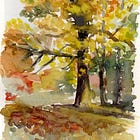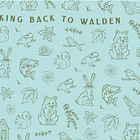🌲 Talking Back to Walden
April: T.O.C. and status update
Welcome to Talking Back to Walden. This is where we consider only the best passages of Thoreau’s 1854 classic, for what they might tell us about our present-day environmental woes and hopes. Last month, we noticed the wind. How it feels on our skin. How it affects our breathing. How it smells. How the wind acts on others: trees, flowers, birds, other animals. And how the wind affects mood and stirs emotions or memories. Next month will be a big one. I’m finally tackling Thoreau’s building of his cabin under the critical theme of shelter.
“This frame, so slightly clad, was a sort of crystallization around me, and reacted on the builder.” ~ from chapter 2, “Where I Lived, and What I Lived For.”
Shelter is so essential that Maslow built his entire pyramid on its foundation along with air, water, food, sleep, clothing and reproduction. To be housed. To have a roof over your head, a safe place to lay that head to sleep. Being unhoused is unthinkable. In addition to my response, sections include a sublime passage from Lauren Groff’s The Vaster Wilds and a consideration of the devastating causes and toll of homelessness in the U.S.
Meanwhile, today I pause to assemble the series Table of Contents, and reflect on the response so far. Eventually, I will write a more complete introduction and epilogue. I may even reach out to one or two super-fans of this series to write a short piece. Stay tuned. Thanks for coming along on this adventure to explore a beloved classic of environmental literature. Indeed, it’s arguably the cornerstone on which nature writing has been built.
Table of contents
September: Encounters with water
October: Song of the trees
November: The mysterious animacy of houses
December: The joy of sensory engagement with the world
January: What is winter’s frozen secret, just for you?
February: Warmth, the origin
March: Wind, our breath-body
May: Shelter, from the practical to the transcendent
Response
I’ve been so grateful for the response to this series. My aim is to explore Thoreau’s topics and themes from several dimensions: sensory and experiential, rational and fact-based, spiritual and immersive. As I seek to repair and rebuild my relationships with the “others” that I encounter “out there” in “nature,” I employ all of these modes.1
I love learning about nature from a scientific point of view, as well as being with a stream or a tree or a patch of moss or a stone or the wind on their own terms. I seek to trust the boundlessness of my heart and to test the limits of language. I’m guided by the words of wise mentors and brilliant writers, and long to share what I find with readers here.
It delights me when readers share their own responses to Walden and to these explorations. Your metaphors and experiences of places near and far, your wonder and awe inspire me to keep digging and writing.
said this about the March post: “I love every post in [the] Talking Back to Walden series. I always leave the post with so much to think about.” Of the suggestion to sit and observe the wind’s effects, responded: “I love your suggestion to walk and sit in the same place three days in a row, I'm going to do that.”In our February chat about the sun’s sublime power,
shared this gorgeous photo with a note: “I love the low-angled light the sun gives at this time of year in Michigan. But this year we haven’t seen much of it because it’s been so cloudy.” said in January: “Winter has a beautiful stillness that doesn't exist in other seasons ... It's sad that the seasons are starting to blend together slowly.” shared a regret familiar to many of us in December: “Recently, I have had so little time to fit everything I need to do into my day, and time outdoors has suffered. I miss my friends in the woods, miss the mysteries and familiar, miss the sounds and sensations of being alive amongst such.” asked in November: “What would Thoreau have thought about the world today? I often wonder that.” said this in October: “I’m so moved by this post. As I read it, I’m looking at shiny green trees in a small city in southern India, palms, rubber trees, mango, and others I don’t know the names of. I wonder what they would say if they could talk to trees on the other side of the world.” What a marvelous thing to wonder! said this in September: “We need to trip over more branches, get soaked in more rain storms, and miss a few more hot showers and meals to start an escape from our human feed lot existence.”To that, and to all these comments, I say, HEAR, HEAR. 💚
Thanks for reading Talking Back to Walden. If you enjoyed this, please share. For more like it and for my regular weekly posts, please consider becoming a free or upgrading to paid subscriber.
Another way to show 💚 is to share this post with others by restacking it on Notes, via the Substack app. Thanks!
Even after years of trying, I still struggle to language these concepts. In indigenous languages, there is no word for “nature,” because it’s not something separate from us that needs to be named. Despite my obsessive study of Robin Wall Kimmerer’s sublime writing, I haven’t found my own (authentic) way to say “non-human others” or “my non-human kin.” The word “non” just feels wrong. “Other than human” isn’t any better. Sometimes I’ll say “sacred other” in reference to a numinous encounter. Usually, though, I use words like “nature” and “the environment,” often interchangeably. It’s lazy, sure, but also how most people understand these things. And I do want to be understood. On a slight tangent, I’ve always loved David Abrams’ reversal of how we refer to leaving our house to go outside. We aren’t, he suggests, going out so much as going in—into immersion, into the milieu in which we evolved, into our true home.












I love this overview and it makes me feel so curious about all the gems hidden in this series. Great for an intro and overall take aways from reading this, Julie.
Loved this, thank you, a really good idea to share a T.O.C. too; I like how you did so.
I still have not had much time (so much is taken up with looking for work that, when I do find something, I am sure I'll have considerably more to do other things!), but at least I can now leave the study window open and listen to the birds in the forest.